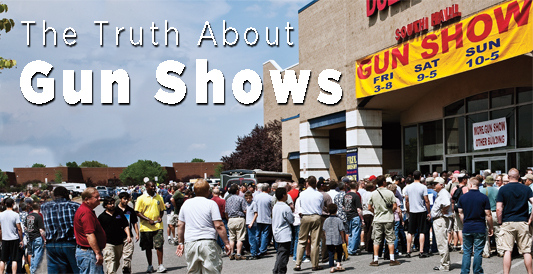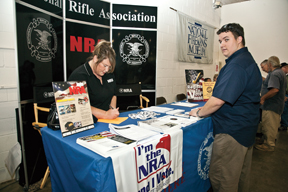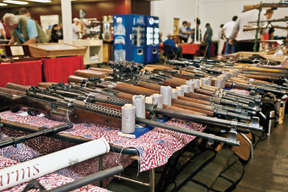
Recent attacks on American gun shows are not about law enforcement or punishing the guilty, they are about exploiting a lack of knowledge on the part of the general public and paving the way for universal firearm registration ... and, if history is anything to go by, confiscation.
by MARK A. KEEFE, IV
Editor-In-Chief, American Rifleman
Photos by LLOYD HILL
RECENTLY, I RAN INTO SOMEONE I hadn’t seen since my high school days--I’ll call him “Danny.” We talked about mutual friends, families, careers and personal interests and when he learned of my occupation, it became apparent that he belongs to what I call the “I own guns, BUT …” group of Americans. The “BUT …” in our conversation was the fact that he really didn’t understand--and had never attended--gun shows. Still, he told me, he knew all about them from the media. And he knew for a “fact” that they should have additional government control.
Our conversation was upsetting and all too short. Danny was amazingly uninformed on something that most NRA members understand and treasure as part of American freedom. So I knew what I had to do: I had to tell the true story in the form of a heart-felt primer about gun shows.
I write this not just for Danny, but for all such ill-informed “I own guns, BUT…” folks everywhere. As for those of you who know the facts, remember, whether writing or speaking, we only convince people one person at a time.
So, What Are Gun Shows? Gun shows offer a variety of firearms and accessories that you can’t find under one roof in even the largest gun shops. Stores don’t have room for 2,000 to 10,000 tables devoted to firearms and accessories. And then there are the gun shows that offer a variety of both old and new, used or currently manufactured merchandise. They are no different than book fairs, car shows or counted cross-stitch shows--all of which share free speech, the right to assemble and the right to peaceable commerce between individuals. All of these assemblies represent the same thing: a gathering of Americans with a common passion--for freedom.

The 21st century American gun show has its roots in the market fairs and swap meets of our forefathers. The trading of firearms between private individuals goes back to even before the founding of our country. A modern-day example is well-illustrated by one of my favorite gun shows. When it was last held in July at the Dulles Expo Center in Chantilly, Va., the Nation’s Gun Show exhibited more than 1,700 vendor tables in two buildings. More than 10,000 people from all over the country attended and participated. No, they assembled.
As usual, I was looking for military M1911s, which have always been an interest. My grandfather carried one in World War II and I have several rebuilt guns I’ve been slowly restoring. One parts seller in particular I’ve been buying from for years has one of the best tables of bins brimming with M1911 parts I’ve seen anywhere.
And then there’s my good friend Phil Schreier. He goes to the Nation’s Gun Show for the same reason he attends countless other shows. “To enhance my collection,” he explained. “I’m always looking for better, higher-condition examples or for items not represented in my collection.” Phil is senior curator of the National Firearms Museum and manager of NRA Gun Collector Programs. We’ve walked the aisles of many a show together and to us, gun shows define the pursuit of happiness.
Of course, some collecting organizations, such as the prestigious Ohio Gun Collectors Ass’n, don’t allow the public to attend: members and guests only.
The NRA Annual Meetings & Exhibits feature an entire aisle of nothing but such educational displays competing for medals and awards from the NRA Gun Collectors Committee. Think of it as the Stanley Cup for gun collectors. The NRA Gun Collecting Department puts on a National Gun Collecting Leadership Seminar every year. The department also works with one of the NRA’s many affiliated gun collecting clubs to put on the annual NRA National Gun Collectors Show. The plastic ties you see on guns at most shows today are thanks to the efforts of NRA-affiliated collecting organizations wanting a simple, visible means to ensure every firearm for sale or on display is safe and unloaded.
 I asked Glen Caroline, who is NRA-ILA’s grassroots director, about the First Amendment side of gun shows. “Recent legislation that would end gun shows as we know them would gravely impact the lawful transfer of firearms themselves, and would also end the transfer of information and political dialogue that is crucial to our grassroots efforts in communicating with our members and lawful firearm owners,” he told me. “This kind of legislation is not only an affront to the Second Amendment, but would also have dire consequences for the First Amendment rights of gun owners.”
I asked Glen Caroline, who is NRA-ILA’s grassroots director, about the First Amendment side of gun shows. “Recent legislation that would end gun shows as we know them would gravely impact the lawful transfer of firearms themselves, and would also end the transfer of information and political dialogue that is crucial to our grassroots efforts in communicating with our members and lawful firearm owners,” he told me. “This kind of legislation is not only an affront to the Second Amendment, but would also have dire consequences for the First Amendment rights of gun owners.”
At gun shows I’ve met county sheriffs, state senators, state representatives and even a serving U.S. congressman or two. As many shows as I’ve attended, I can’t recall not seeing police cars in the parking lots or uniformed officers in the aisles. At the shows I attend, it’s not uncommon to see BATFE agents standing in the aisles talking to officers in uniform, retired FBI agents or dealers. Hardly the company career criminals want to keep.
Who’s Behind The Table? At shows, you’ll find guns on the tables of Federal Firearms Licensees (FFLs) and private individuals. Before 1986, most with guns at their tables at shows were collectors, selling a few items from their personal collections, as FFLs were prohibited from conducting business at shows. The 1986 McClure-Volkmer Firearms Owner Protection Act allowed FFLs to conduct business at other locations, and FFLs started attending shows--the vast majority of tables with guns on them at major shows are run by FFLs--all following the same laws by which they abide at their licensed places of business.
You do not need an FFL to sell polished rocks, army boots or surplus underwear at a gun show. At some shows, fully half of the “dealers” have no firearms at all on their tables. Books, scopes, knives and accessories are items not under the purview of the Gun Control Act of 1968.
Steve Clark, the proprietor of Beaver Creek Arms, which specializes in vintage firearms and military souvenirs, came from his home in Dillsburg, Pa., to exhibit at the Chantilly show for the first time. Clark began his career in firearms as a hobbyist and now relies on it for a full-time living. “I spent 32 years in industry,” said Clark, a kindly, middle-aged man, then added, referring to the recent tough financial times on Wall Street, “We lost a lot of our investments.” Of his new career, he said, “It’s an investment venue. When I look at my 401(G),” he says with a grin, hoping that the listener understands that the “G” stands for gun, “it looks pretty good.”
But guns aren’t all that’s for sale at gun shows. Also at Chantilly, Jeni Benos, a vendor from Pearisburg, Va., has banked on her warm personality and talents as a jewelry maker to establish a spot for herself during the past few years. Designs in her Jenuinely Jeni line include Pistol Petals, floral-themed pendants she hand crafts by peeling back and polishing the brass cases of spent handgun cartridges.
“They make a great statement about the Second Amendment,” she said with obvious pride and enthusiasm.
What “Loophole”? Anti-gunners call private individuals who sell a few guns from their personal collections--their personal property--the so-called “gun show loophole.” What some refer to as a “loophole” is actually federal law.
Consider this. There is nothing anyone can think of that involves criminals and guns that isn’t already covered under federal law--and that includes anything a criminal might do at gun show. Anything.
 Whether it’s at a gun show or anywhere else, acquisition of any firearm by a “prohibited person” under 18 U.S.C. 922(g) is a crime. Any felon who attends a gun show and touches a gun--or ammunition--is in violation of federal law with a 10-year criminal penalty as a start.
Whether it’s at a gun show or anywhere else, acquisition of any firearm by a “prohibited person” under 18 U.S.C. 922(g) is a crime. Any felon who attends a gun show and touches a gun--or ammunition--is in violation of federal law with a 10-year criminal penalty as a start.
The same goes for fugitives from justice, drug addicts, adjudicated lunatics and domestic abusers. Interstate transportation, transfer of a firearm or ammunition by anyone in those prohibited categories, are felonies.
Terrorists? They are already covered by harsh federal law. An act of terrorism is a crime. Planning an act of terrorism is a crime. So, understand that acquisition of a gun or ammunition by anybody intended for criminal purposes is a federal felony.
Straw sales? Covered. It is a felony for anyone who is not a prohibited person to acquire a gun or ammunition for anybody in the prohibited category. All of this covers any gun--cheap gun, long gun, concealable gun or even a so-called “assault weapon.”
The best data available from the U.S. Department of Justice indicates that only 0.7 percent of criminals obtained their firearms from gun shows. And those criminals violated the law: They committed serious crimes for which they could spend years in jail.
Understand the “closing” of the so-called “gun show loophole” for what it means. It would make it a criminal act for peaceable, law-abiding citizens to buy or sell guns freely as they do today. Legislation on the so-called “gun show loophole” would make it a crime for ordinary Americans to arrange the sale of a firearm outside the show. “Can’t afford it now? See you next week at your home.” A crime. They seek to put you and your guns into a federal database--for every firearm transferred in America, starting with gun shows.
What is the real point of “closing” the so-called “gun show loophole”? If it is to prohibit criminals from obtaining firearms, all the tools are already there. Bottom line, if it’s illegal under federal law, it’s illegal at a gun show.
How about enforcing the law? According to the mainstream media, one can simply walk into any one of the estimated 5,000 gun shows held annually in the United States and purchase machine guns, grenades and rocket launchers, no questions asked, cash and carry. At no place in the United States is such conduct legal. Federal and state laws regarding firearms apply to every corner of the nation--including gun shows.
Endgame So, what do those who would end gun shows really want for you and me? A permanent record of every gun owner and firearm in the United States on a federal computer. It’s gun shows today, but all private transfers between law-abiding citizens are the objective.
The Bradys proved their goal. In 1989, the Roberti-Roos Act passed, the so-called “assault-weapon ban,” in California. Gun owners in that state--where all sales must be registered and run through FFLs--were sent notices to register their affected guns or face fines or prison. The state imposed a deadline for the registration of “assault weapons.” There was confusion regarding the registration. Guns not covered by the ban were registered, and others who had guns that should have been registered didn’t get the word or were initially afraid to register their guns. When owners affected by the ban asked the state if they could register the guns after the deadline, California said yes.
Many did just that. Not satisfied, the Bradys sued the state and forced California to tell everyone who registered a gun after the deadline to get the gun out of the state or it would be confiscated. Anti-gunners used the courts to force the confiscation of guns from citizens who registered their guns and tried in good faith to comply with the law.
The calls to end the traditional American gun show and close the non-existent “gun show loophole” infringe on both the free speech and Second Amendment rights of law-abiding Americans. These infringements have far-reaching effects.
The next time I see my friend Danny I’m going to give him a copy of this essay. I hope others will copy it, too, and pass it on to people they might know among that “BUT …” class of gun owners, or to non-gun owners so they can better under-stand the truth about gun shows.
--Brian C. Sheetz and James O.E. Norell contributed to this story.








 More Like This From Around The NRA
More Like This From Around The NRA





